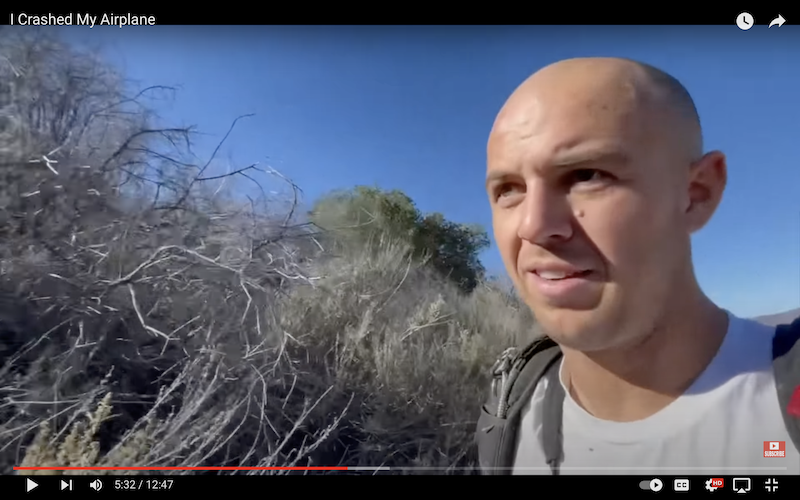
Trevor Jacob, a 30-year-old YouTuber pilot who intentionally crashed his plane to drive up views on a sponsored video, has been sentenced to six months in federal prison, the US Attorney’s Office announced Monday.
Earlier this year, Jacob pled guilty to “deliberately” crashing the plane, destroying the plane wreckage, and repeatedly lying to officials, obstructing federal probes into the crash. His sentence is much lower than the maximum sentence of 20 years that he may have faced had he not accepted a plea deal.
An “experienced pilot, skydiver, and former Olympic athlete,” Jacob hatched his plot to crash the plane after a company agreed to sponsor a video in which Jacob would promote a wallet, the US Attorney’s Office said.
To make the video, Jacob “mounted several video cameras on different parts of the airplane and equipped himself with a parachute, video camera, and selfie stick,” then took off from a California airport. Approximately 35 minutes into the flight, he recorded himself pretending to respond to a fake engine failure and deciding to parachute out of the plane. He then documented his dramatic hike back to the wreckage, where he retrieved the video footage that he uploaded to YouTube in late December 2021.
Today, the video, “I Crashed My Airplane,” has racked up 4.4 million views. YouTube commenters have since criticized the video as “super dangerous” and a “slap in the face to pilots who have faced real emergencies and weren’t so fortunate.”
Federal investigators got involved after Jacob reported the crash to the National Transportation Safety Board, agreeing to share the location of the crash. In the subsequent weeks, however, Jacob instead “lied to investigators that he did not know the wreckage’s location,” the US Attorney’s Office said.
After claiming to not know the location, Jacob actually returned to the wreckage site, “then cut up and destroyed the airplane wreckage,” dumping pieces of the plane into trash cans in different locations. This, the US Attorney’s Office said, “was done with the intent to obstruct federal authorities from investigating” and “make money through the video.”
In addition to lying about the plane’s location, Jacob also lied about the cause of the crash, telling investigators that the plane “experienced a full loss of power” soon after takeoff. He falsely claimed that he only parachuted out of the plane after deciding that there was no safe place to land—when really he intentionally abandoned the working plane after pointing it toward “a dry brush area in Los Padres National Forest.”
“It appears that [Jacob] exercised exceptionally poor judgment in committing this offense,” prosecutors wrote in a sentencing memo. “[Jacob] most likely committed this offense to generate social media and news coverage for himself and to obtain financial gain. Nevertheless, this type of ‘daredevil’ conduct cannot be tolerated.”
A court order said that Jacob must surrender to the Bureau of Prisons by January 29, 2024. Upon release, Jacob will next “be placed on supervised release for a term of two years.”
According to a sentencing memo drafted by his attorneys, Jacob “regrets” the “stunt,” which he claimed that he planned while “in a lonely place” in the “wake of the Covid lockdown.” Jacob admitted that his “bad choices” came after he had spent his life dedicated to succeeding in extreme sports that he said “provide a personal rush and sense of unique achievement” and often are “lonely endeavors” where the “voice in your head is the only thing that keeps you going.”
“The same qualities that have brought Trevor success and fame in these extreme sports led him to a series of bad choices that culminated in the offense to which he has pled guilty,” the defendant’s sentencing memo said. “In a lonely place, Trevor carefully planned a new stunt that he regrets. Worse yet, he covered it up and then lied about it to investigators. As the sentencing letters reflect, he sincerely and honestly regrets this conduct, and has given heartful apologies to everyone in his life who has been adversely affected by his crime.”
That memo argued that a term of imprisonment was “not necessary” because other than misdemeanors associated with train hopping, Jacob had “no criminal history.” Rather, Jacob hoped for one year of probation for his crimes. US District Judge John F. Walter seemingly disagreed, imposing a six-month sentence in a recommended minimum security facility and two years of probation.
This post was originally published on this site be sure to check out more of their content.








